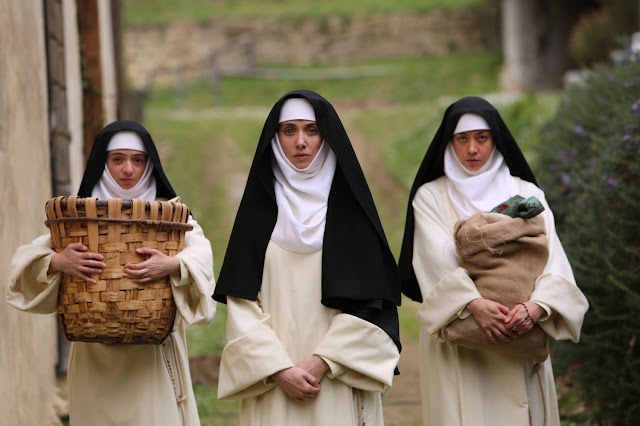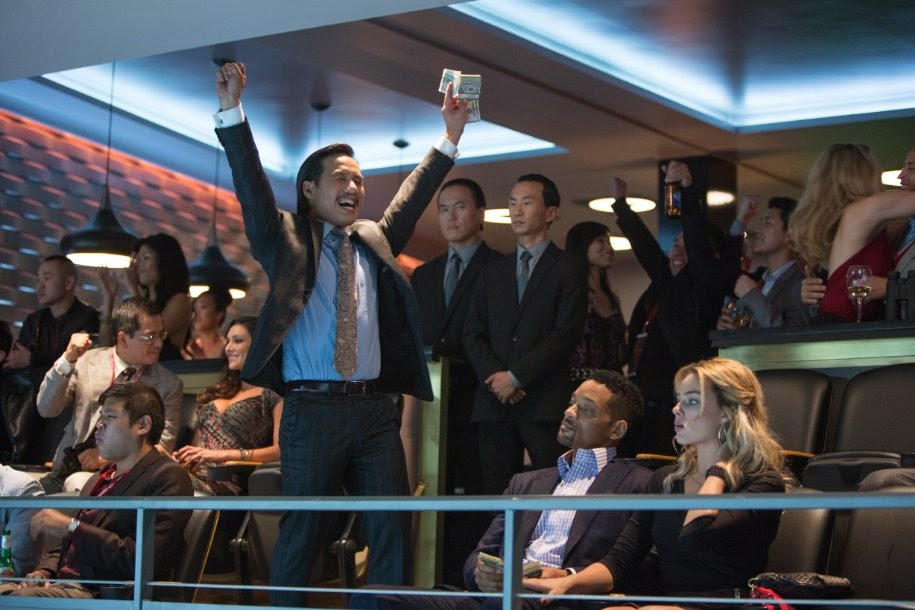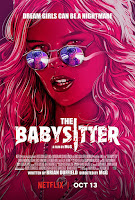The Little Hours
The Little Hours
(2017)
Directed by: Jeff BaenaWritten by: Jeff Baena
Starring: Alison Brie, Dave Franco,
Aubrey Plaza, Kate Micucci,
& John C. Reilly
Rating: 14A
Release Date: June 30, 2017
 |
| Kate Micucci, Alison Brie & Aubrey Plaza are up to no good in The Little Hours Image Source |
Brown University's website, the Decameron Web, states Boccaccio's text as one "hundred stories, shared in ten days by ten young people escaping the Plague in mid-14th-century Florence," (source). Originally written in Italian, the text is much like Chaucer's middle English Canterbury Tales, ranging from obscene, to subtle, to satirical, all capturing the zeitgeist of a plague-addled middle aged Italy. It's this framework, (and the structure of some of Boccaccio's tales), that give The Little Hours it's plot.
Within the Black Death infested Italy, the audience is introduced to Massetto, (Dave Franco), a hunky servant under the mastery of Lord Bruno, (Nick Offerman, in a scene stealing cameo and hilarious wig). Massetto is soon is forced to run for his life when Bruno discovers Massetto has been in secretly bedding his wife. Finding himself alone, helpless and virtually homeless, Massetto stumbles into Father Tommasso, (John C. Reilly), drunk and confused, who is in need of a helping hand. Offering his, Massetto is soon hiding in plain sight, with the help of Father Tommasso, by pretending to be a deaf-mute at the Father's covenant. In return for a bed, food, and shelter, all Massetto has to do is menial work on the church farm, keep an open ear for secrets, and share a pint or two of sacramental wine with the Father once and a while. What seems like a simple case of quid pro quo is anything but; with sexually frustrated young nuns, superiors in the midst of existential crises, and a coven of witches hiding off the horizon, Massetto soon discovers Tommasso's convent is full of secrets, lies, hidden motivations and lots, and lots of pre-marital sex.
If that seems like a doctoral thesis worth of plot to sift through - that's because it is. The first twenty or so minutes of the film is spent setting up the characters, motivation, setting and verisimilitude of the film. While this does lead to a little boredom and impatience on the audiences part, it's worth sifting through to get to the ripe comedic core that closes the film. Although it's clearly set in the 1300's, in the lush, exuberant Italian countryside, the dialogue is distinctly modern, with profanity laced insults, and free-spirit attitudes that one would find at the local shopping mall - not a middle age convent. However, due to a script that lays out just enough bare bones plot and structure, the cast is left with enough breathing room and direction to create a believable world - as if how they speak is somehow just a translation of middle english to modern english, (even if the dialogue was largely improvised). Within this cinematic middle age, the cast too, takes their task seriously.
Dave Franco's career, has seemed like a case of brotherly nepotism since his breakout role in 21 Jump Street. Yet it seems that the talent his brother James showcases again and again is alive and well in 'little' Franco. In The Little Hours Franco takes his role head on; with the mannerisms, body language and swagger theatregoers have come to expect from a pre-industrial era film. As well, when Franco is called upon to communicate as if he's a deaf-mute, he seamlessly pulls off the complex body language, and is totally believable. John C. Reilly, too, takes what ostensibly is a "drunk father" stereotype and makes Father Tommasso a well rounded, complex and often hilarious character. It's a testament to both actors' skills that The Little Hours comes off as more of an intelligent satire/adaptation than a straight up spoof of the genre. It's more Barry Lyndon than it is Monty Python or Your Highness. The rest of the ensemble, too, is fantastic; Alison Brie continues her winning streak of loveable female anti-heroes, (her performance in the Netflix series Glow is brilliant), Kate Micucci is finally able to breathe in a performance outside of her typecast, and the always explosively hilarious Aubrey Plaza is in full force here, using her deadpan delivery with the comedic skill of someone twice her age. Molly Shannon, Paul Reiser and the aforementioned Nick Offerman all too, are absolutely excellent in their short screen time. The only case of bad casting is the hot and cold Fred Armisen.
Proving his comedic chops in the hilarious series Portlandia, and smaller roles in 7 Days in Hell and EuroTrip, Armisen has proven that he has what it takes to make people laugh. His tenure on Saturday Night Live, too, was rocky at best, but he did have some great moments that led to him sticking around for over a decade. Still, his schtick of "I'm awkward but I know I'm awkward so actually that makes you awkward" is so stale it's concrete; yet he continually allows himself to be typecast into roles that take advantage of this neutered persona. Thankfully, he's not too over the top here, and the distracting elements of his worst comedic habits don't quite break the fascinating barrier of The Little Hours' world. Overall, Armisen's bombastic style, as well as the heavy plotting at the beginning of the film could easily derail any movie, especially one with the complex timing of a comedy; thankfully the swift direction of Baena assures the Hours doesn't run too long. In a motion picture that combines literary, cinematic and theatrical history, it's a wonder the film works at all.
For a film that attempts to chip away at the canon of classic literature and translate said literature into a comedy for a modern audience, the filmmakers are already fighting an uphill battle. Trying to include visual and audio callbacks to older films on top of that might seem like an impossible task. Yet, with just enough allusions to classic films, editor Ryan Brown, cinematographer Quyen Tran and director Baena successfully pay homage to Black Narcissus, the Seventh Seal and, in a purely visual sense, even Barry Lyndon. The finished product truly shows that a team effort under a watchful eye can make for a thoroughly interesting final result.
In closing, The Little Hours' greatest strength, (and what likely makes it unable to reach a mass audience), is its greatest weakness - it’s very 'inside baseball' for both literary and cinema minded people; some metaphors, puns, references and allusions might be lost on most viewers - but hell, that’s what repeat viewings are for. In this day and age, it’s a miracle something so odd, so goofy, so outside the box, and (surprisingly), brilliant can get made when audiences usually find themselves adrift in a sea of mega-blockbusters. The Little Hours has a few faults; some bad casting and a slow start; yet it's too weird, too interesting and too damn funny to ignore.
Grant's Rating: 3.5/5 Stars
Aubrey Plaza and Alison Brie introduce
themselves to Dave Franco in The Little Hours



Comments